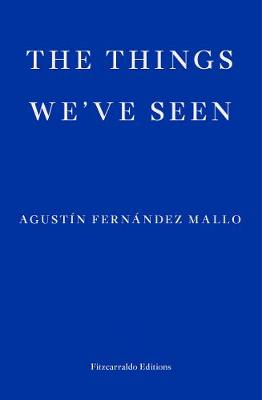
The Things We’ve Seen
Agustin Fernandez Mallo, Thomas Bunstead
£14.99
Description
In The Things We’ve Seen, his most ambitious and accomplished novel to date, Agustin Fernandez Mallo captures the strangeness and interconnectedness of human existence in the twenty-first century. A writer travels to the small uninhabited island of San Simon, used as a Franquist concentration camp during the Spanish Civil War, and witnesses events which impel him on a wild goose chase across several continents. In Miami, an ageing Kurt Montana, the fourth astronaut who secretly accompanied Neil Armstrong and co. to the moon, revisits the important chapters in his life, from serving in the Vietnam War to his memory of seeing earth from space. In Normandy, a woman embarks on a walking tour of the D-Day beaches with the goal of re-enacting, step by step, another trip taken years before. Described as the novel David Lynch and W. G. Sebald might have written had they joined forces to explore the B-side of reality, The Things We’ve Seen is a mind-bending novel for our disjointed times.
Publisher Review
'A narrative conception that transforms the reality of the past century into a fiction replete with unusual images combining poetry and science, history and politics. A moving structure animated by sporting ambitions, the novel traces out a tragicomic map of our contemporary world.' -- The jury of the Biblioteca Breve Prize 2018 'War Trilogy confirms Fernandez Mallo as one of the leading Spanish-language writers today, a master of a style and of a world each absolutely his own.' -- Jorge Carrion, New York Times in Spanish, Top 10 Novels of 2018 'One of the most significant Spanish novels of the last decade.' -- La Tercera 'War Trilogy is the Galician poet and novelist's most ambitious work to date. A novel of ideas that melds literary forms in order to discuss time, silence, and the itinerant, migrant character of all humankind, not to mention love. A map of the contemporary world.' -- Winston Manrique, WMagazine 'A gradual weaving together goes on between the triptych that forms the Trilogy, and a point comes at which the poetry of the whole dawns -- erupts -- on the reader. In that moment, the turbid layers of technology and discourse that occlude the past fall from your eyes. Somewhere between archaeologists and technophiliacs, and simultaneously bearers of all of Europe's long past, the characters in War Trilogy return from places where time stands still, as though they have been plunged into the void or some place where time simply does not pertain.' -- Clarin
Book experts at your service
What are you looking for?